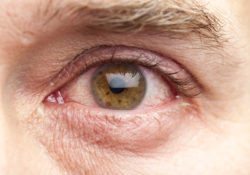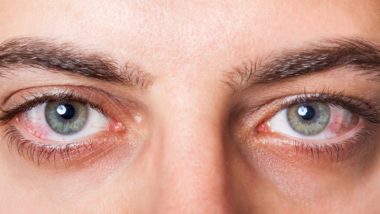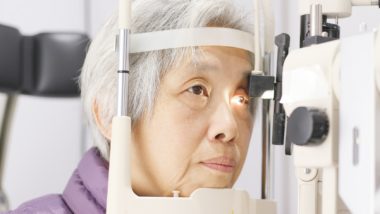Top Class Actions’s website and social media posts use affiliate links. If you make a purchase using such links, we may receive a commission, but it will not result in any additional charges to you. Please review our Affiliate Link Disclosure for more information.
Macular degeneration is a type of eye damage that may result in loss of vision. Although many cases of macular degeneration are age-related, the condition may also be caused by exposure to certain medications, including Elmiron.
The Two Types of Macular Degeneration
There are two main types of macular degeneration, or ongoing damage to the macula. The macula is located in the retina at the back of the eye, and is the part of the eye responsible for central vision, colour vision, and the ability to read or see things in fine detail. There are many photoreceptor cells located in the macula. These cells detect light and send signals to the brain, which translates the light into images.
Most people who develop macular degeneration suffer from dry macular degeneration. Dry macular degeneration often develops first in one eye, before developing in the other. This condition causes layers of the macula to get progressively thinner over time, resulting in the loss of photoreceptor cells. This loss may cause people suffering from the condition to experience vision loss including visual distortion, reduced central vision, difficulty adapting to low light levels, difficulty reading, decreased color sensitivity, or difficulty recognizing faces.
Dry macular degeneration also causes the development of drusen on the retina. Drusen are small deposits of fatty proteins or extracellular waste that build up on the eye.
The other type of macular degeneration is wet macular degeneration. The main difference between dry macular degeneration and wet is that wet macular degeneration results in the leakage of fluids from blood vessels in the eye. Approximately 10 percent of people who suffer from age-related macular degeneration experience the wet form of the condition.
In these cases, new blood vessels grow behind the retina. However, these new blood vessels are weak, and allow fluid to leak out of them and onto the retina and macula. Due to this leakage, people who are diagnosed with wet macular degeneration are more likely to experience a sudden change in vision, while people with dry macular degeneration may experience vision loss gradually.
Risks of Wet Macular Degeneration
Wet and dry macular degeneration are two stages of the same condition. While most people who develop macular degeneration will only experience the dry form of the disease, around 10 percent will progress to the wet form. The wet form may be more dangerous, as it may result in serious damage to the eye and lead to issues such as blurred or distorted vision, eye pain, inability to read, or areas of vision loss.
Signs of Dry Macular Degeneration
Although macular degeneration may cause permanent eye damage, diagnosing the condition early may be one way to prevent further vision loss from occurring. Early symptoms of dry macular degeneration may include difficulty reading, fine details appearing to be blurry, straight lines appearing to be wavy or distorted, extra sensitivity to glare, and difficulty adjusting to different light levels.
Causes of Macular Degeneration

Macular degeneration may also be caused by exposure to some medications, including Elmiron. Elmiron is a medication used to treat interstitial cystitis, a painful bladder condition. Interstitial cystitis affects more than one million people in the U.S., and Elmiron is the only FDA-approved treatment.
According to studies on the long term effects of Elmiron, it is believed that the drug may be capable of causing damage to the macula and permanent vision loss. Janssen, the drug’s manufacturer, has even upgraded Elmiron’s warning label to include pigmentary maculopathy.
“Maculopathy” is a medical term which refers to a progressive eye disease that causes vision loss by affecting the macula. In some cases, maculopathy and macular degeneration are used interchangeably. However, in the case of Elmiron, pigmentary maculopathy refers to the changes in pigment in the pigmental layer of the retina.
In 2018, doctors published an article detailing this phenomenon in six patients who saw the same clinician between May 2015 and October 2017. These patients reportedly sought help from an ophthalmologist after experiencing symptoms such as difficulty with reading or a hard time adjusting to dark rooms.
Upon examining the patients with retinal imaging and other methods, doctors reportedly identified hyperpigmentation of the retina surrounded by deposits similar to those seen in vitelliform – a form of macular degeneration affecting the retina’s pigment layer.
Reports from the affected patients showed that all of the patients presenting with this mysterious problem had one thing in common – they all had chronic exposure to Elmiron for interstitial cystitis treatment. In the study, researchers called for further investigation of the issue.
Since this study, medical and industry professionals have weighed in on the issue. In 2008 safety trials for Elmiron, results led to the conclusion that the medication was “safe and effective” in treating the “severely devastating symptoms” of interstitial cystitis.
Unfortunately, chronic exposure to this medication may lead to serious issues in the form of macular degeneration. With a lack of information available, it is hard to tell if patients will be able to recover from this condition or if their vision is permanently changed.
Wet and Dry Macular Degeneration Treatment
Treatment for macular degeneration may not be able to repair vision that is already damaged. However, in many cases it can stop further damage from occurring. An eye doctor may recommend courses of treatment including medications that are injected into the eye, or photodynamic therapy using laser beams.
In cases where central vision has been seriously damaged by the condition, low vision rehabilitation therapy may be the best option. This rehabilitation helps patients find ways to adapt to their new level of vision.
Join an Elmiron Side Effects Lawsuit Investigation
If you took Elmiron and developed pigmentary maculopathy, you may qualify to participate in an Elmiron side effects lawsuit investigation.
Fill out the form on this page for a FREE case evaluation.
ATTORNEY ADVERTISING
Top Class Actions is a Proud Member of the American Bar Association
LEGAL INFORMATION IS NOT LEGAL ADVICE
Top Class Actions Legal Statement
©2008 – 2024 Top Class Actions® LLC
Various Trademarks held by their respective owners
This website is not intended for viewing or usage by European Union citizens.
Get Help – It’s Free
Join a Free Elmiron Lawsuit Investigation
If you qualify, an attorney will contact you to discuss the details of your potential case at no charge to you.
PLEASE NOTE: If you want to participate in this investigation, it is imperative that you reply to the law firm if they call or email you. Failing to do so may result in you not getting signed up as a client or getting you dropped as a client.
E-mail any problems with this form to:
Questions@TopClassActions.com.
Oops! We could not locate your form.













